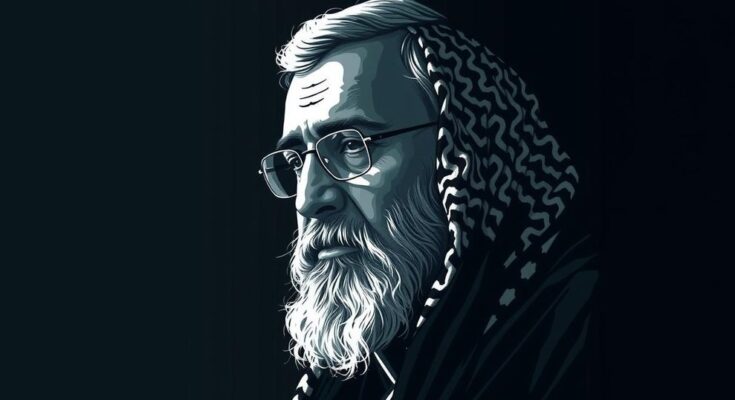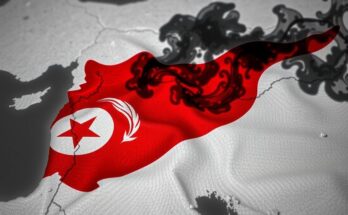The death of Yahya Sinwar, a key Hamas leader, profoundly impacts the Iranian regime and symbolizes the potential collapse of tyrannical regimes. Sinwar, linked to the orchestration of violence against Israel, was declared a hero by Iranian officials, yet evidence reveals a very different reality reflective of his brutal legacy. His demise highlights the ongoing suffering in Gaza and serves as a cautionary reminder of the fate of oppressive powers throughout history.
The death of Yahya Sinwar, a prominent figure within the resistance movement, has profoundly unsettled the Iranian regime. Sinwar was trained by Iran to lead an extensive assault against Israel, aligning with the strategy known as the “Unity of Fronts” aimed at countering the nation often referred to as the “Little Satan.” His demise amidst the destruction of Gaza mirrors the fall of Nazi leaders amidst the ruins of Berlin, underscoring the inevitable downfall of tyrannical regimes such as that which is in place in Tehran. Sinwar was highly regarded by Qasem Soleimani and his successor, Esmail Qaani, as Iran sought to bolster Hamas leadership following the death of Ismail Haniyeh, intending to sustain the conflict in Gaza and impose extensive costs on Israel. Nevertheless, his short-lived tenure was brought to an abrupt end when, on October 16, he was spotted by Israeli Defense Forces (IDF) alongside other Hamas operatives, leading to his fatal injury during subsequent confrontations. His lifeless body was recovered the following day. After a brief silence concerning his fate, Iranian officials proclaimed Sinwar a hero of resistance for his efforts against Israel. Ayatollah Ali Khamenei characterized him as “the shining face of resistance,” and President Masoud Pezeshkian referred to him as a “tireless fighter who fought heroically until his last moment.” Contrary to these heroics, however, evidence suggests a starkly different reality of Sinwar’s final moments. He was reportedly attempting to evade capture by navigating through the ruins of Tel Sultan, seemingly in search of a tunnel leading to safer areas. Upon review by the IDF and Shin Bet, his DNA was discovered in a tunnel complex linked to the site of the confrontation. An IDF drone captured images of Sinwar’s last moments; he was found injured, attempting to shield himself amidst the debris while throwing sticks at the drone. Sinwar’s reputation among many Gazans and observers is not that of a hero but rather as the orchestrator of severe violence. He was responsible for the massacre of over 1,200 Israeli civilians on October 7 and was known for his tyranny and brutality, earning the moniker “the butcher of Khan Yunis.” Accounts of his actions include coercing a Hamas member to bury his own brother alive under suspicion of treachery. Israeli interrogators have labeled him as a man of “unfathomable cruelty” with a singular obsession for violence against Jews, often fantasizing about murder using brutal weapons such as machetes. His leadership has brought upon Gaza further devastation, significantly exacerbating poverty and suffering for the Palestinian populace. It is thus unsurprising that his death has engendered relief among citizens who are wearied by the relentless violence and turmoil. The parallels between Sinwar’s downfall and the carnage of Nazi Germany may evoke reflective considerations on the fates of oppressive regimes and the lasting consequences of tyranny. The Iranian patrons of Hamas, who have frequently invoked disparaging Nazi themes through Sinwar’s rhetoric, would do well to heed the lessons of history regarding the tragic end of the Third Reich.
This article discusses the significant impact of Yahya Sinwar’s death on the Iranian regime and the broader geopolitical landscape of Gaza and Israel. As a prominent figure in the Hamas movement and a known ally of Iran, Sinwar was pivotal in the strategy of confronting Israel and expanding conflicts in the region. His demise serves as a symbolic representation of the potential fall of regimes reliant on violence and oppression, drawing historical parallels with the collapse of Nazi Germany. Through the discourse surrounding Sinwar’s legacy, the article reflects on themes of tyranny, resistance, and the dynamics of power in the Israeli-Palestinian conflict.
In conclusion, Yahya Sinwar’s death serves not only as a turning point for Hamas and its Iranian supporters but also as a critical reflection on the nature of tyrannical regimes. His life and actions mirror the broader implications of violence and the inevitable downfall that such regimes face. The contrasting narratives surrounding his demise—as a hero or as an orchestrator of brutality—underscore the complex legacy he leaves behind, resonating with historical lessons on the peril of oppressive rule.
Original Source: www.jpost.com




